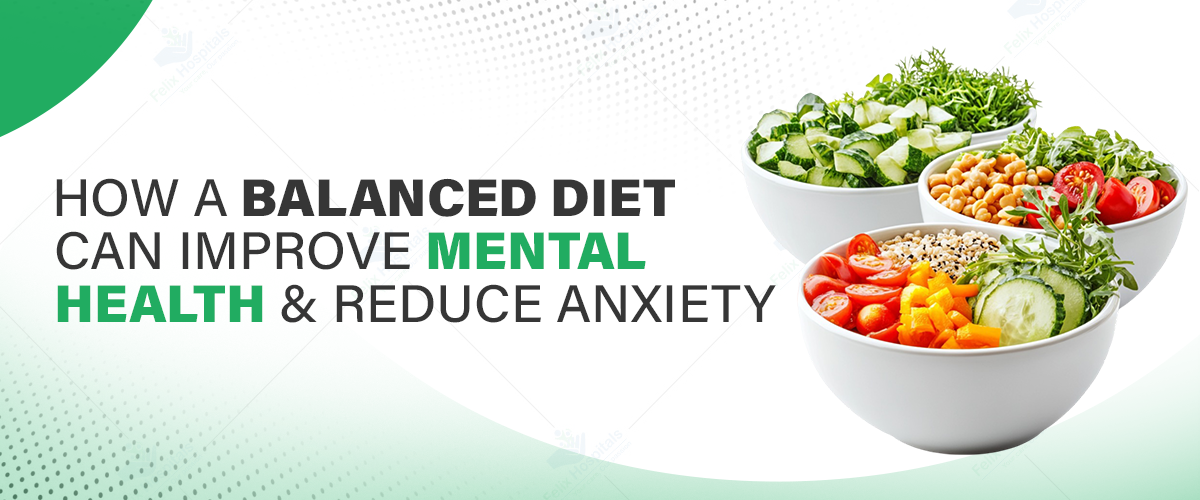
Subscribe to our

The connection between diet and mental health is profound yet often overlooked. What we eat influences not just our physical health but also our emotional well-being. A balanced diet, such as the MIND diet or a mental health diet, can help alleviate symptoms of anxiety, depression, and other mood disorders. According to research, individuals who consume nutrient-dense diets are 25–30% less likely to suffer from mental health issues compared to those who rely on processed and high-sugar foods.
This highlights the vital role of a brain health diet in managing anxiety and fostering mental wellness. If you're looking for anxiety treatment nearby, consider consulting with mental health experts who can guide you toward both dietary adjustments and therapeutic approaches to improve your emotional health.
Contact us at +91 9667064100 now to start your journey toward better mental health through a balanced diet.
The relationship between our gut and brain, known as the gut-brain axis, plays a crucial role in regulating emotions and cognitive functions. A healthy gut, supported by the right nutrients, fosters the production of neurotransmitters like serotonin, which is responsible for feelings of happiness and relaxation.
On the other hand, deficiencies in essential nutrients such as omega-3 fatty acids, B vitamins, and magnesium can exacerbate anxiety, depression, and mood swings. Diets specifically designed to improve mental health, such as the MIND diet or a targeted depression diet, aim to fill these nutritional gaps, reducing mental health challenges significantly.
Incorporating specific nutrients into your brain health diet is essential to boost mental well-being.
For optimal results, your mental health diet should focus on whole, nutrient-dense foods.
Certain foods can negatively impact your mental health, exacerbating anxiety and mood disorders.
Regular meals are important in blood sugar regulation, which affects energy and mood. Skipping food or eating too much causes irritability and fatigue. Water is also as important, assisting the brain and managing stress. Herbal teas, healthy broths, and fruit with water flavor are perfect for hydration when on a mental health diet.
For an overall mental well-being plan, try to use nutrition diet services that will assist you in developing a personalized eating plan for physical and emotional health. Such services can provide you with customized recommendations to improve your diet and manage stress, anxiety, and other mental well-being issues.
Adopting a balanced diet offers more than just anxiety relief. It can improve sleep quality, enhance concentration, and boost energy levels. A mental health diet like the MIND diet also reduces the risk of neurodegenerative diseases, promoting long-term cognitive health.
While adopting a balanced diet, such as a brain health diet, MIND diet, or depression diet, can significantly improve mental health, it may not always suffice for everyone. If you experience persistent symptoms, consulting with a dietician or mental health professional is essential for a personalized and effective plan tailored to your needs.
At Felix Hospital, we pride ourselves on having a team of expert dieticians who specialize in improving mental health and overall well-being. Our dedicated professionals include Dr. Pooja Yadav, and Dr. Shivani Ahlawat. They are committed to guiding you on your journey to better mental health through tailored dietary strategies that align with your unique health goals.
Let us create a personalized diet plan that works for you! Schedule a consultation with the expert dieticians at Felix Hospital today.
A balanced diet plays a pivotal role in improving mental health and reducing anxiety. Incorporating principles from a brain health diet, MIND diet, or depression diet can transform your well-being. Small, sustainable dietary changes, coupled with guidance from professionals, can pave the way to a healthier, happier life. Take the first step today—your mental health deserves it.
1. Can the MIND diet help with both anxiety and depression?
Ans: Yes, the MIND diet emphasizes brain-healthy foods like leafy greens, nuts, and whole grains, which support neurotransmitter production and reduce inflammation, helping alleviate symptoms of both anxiety and depression.
2. How quickly can I see improvements in mental health with dietary changes?
Ans: Results vary, but some people notice reduced anxiety and better mood within a few weeks of adopting a brain health diet or MIND diet. Consistency is key for long-term benefits.
3. Are there specific foods in a depression diet that boost serotonin levels?
Ans: Yes, foods like salmon (rich in omega-3 fatty acids), bananas (high in magnesium), and yogurt (probiotics) help enhance serotonin production, improving mood and reducing depression symptoms.
4. Can a mental health diet reduce the risk of neurodegenerative diseases like Alzheimer’s?
Ans: Absolutely. The MIND diet focuses on foods that protect brain health, such as berries and leafy greens, which are shown to lower the risk of cognitive decline and Alzheimer’s disease.
5. Is it possible to follow a brain health diet on a budget?
Ans: Yes, affordable options like seasonal fruits, frozen vegetables, whole grains, and legumes provide essential nutrients for brain health without breaking the bank. Meal planning can further reduce costs.
6. Can children and teens benefit from a mental health diet?
Ans: Definitely. A diet rich in omega-3s, whole grains, and fresh produce supports healthy brain development and emotional well-being, making it ideal for all age groups.
7. Should I avoid all caffeine if I have anxiety?
Ans: Not necessarily. While excess caffeine can worsen anxiety, moderate consumption, especially from green tea, which contains calming compounds like L-theanine, can be beneficial.